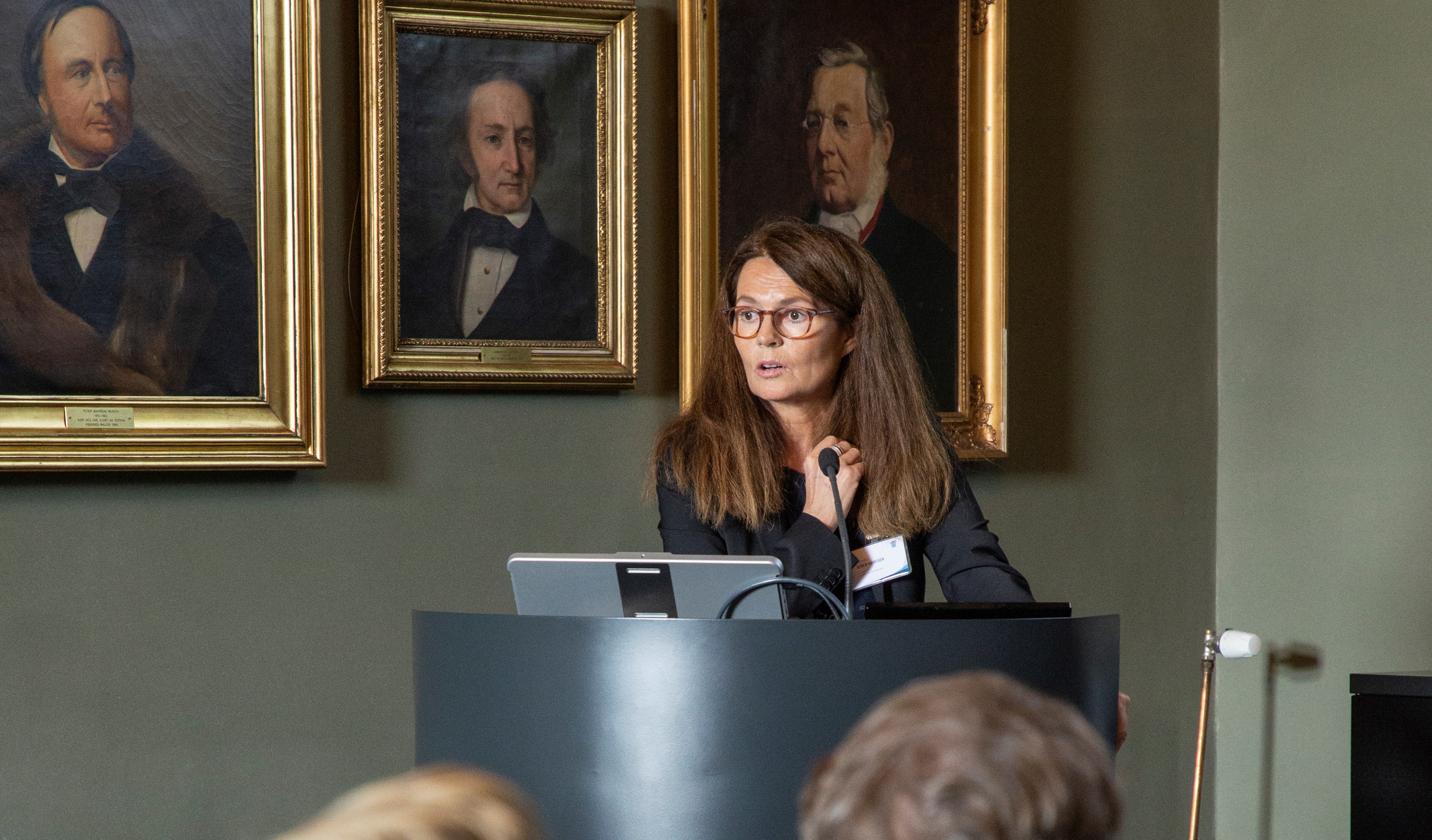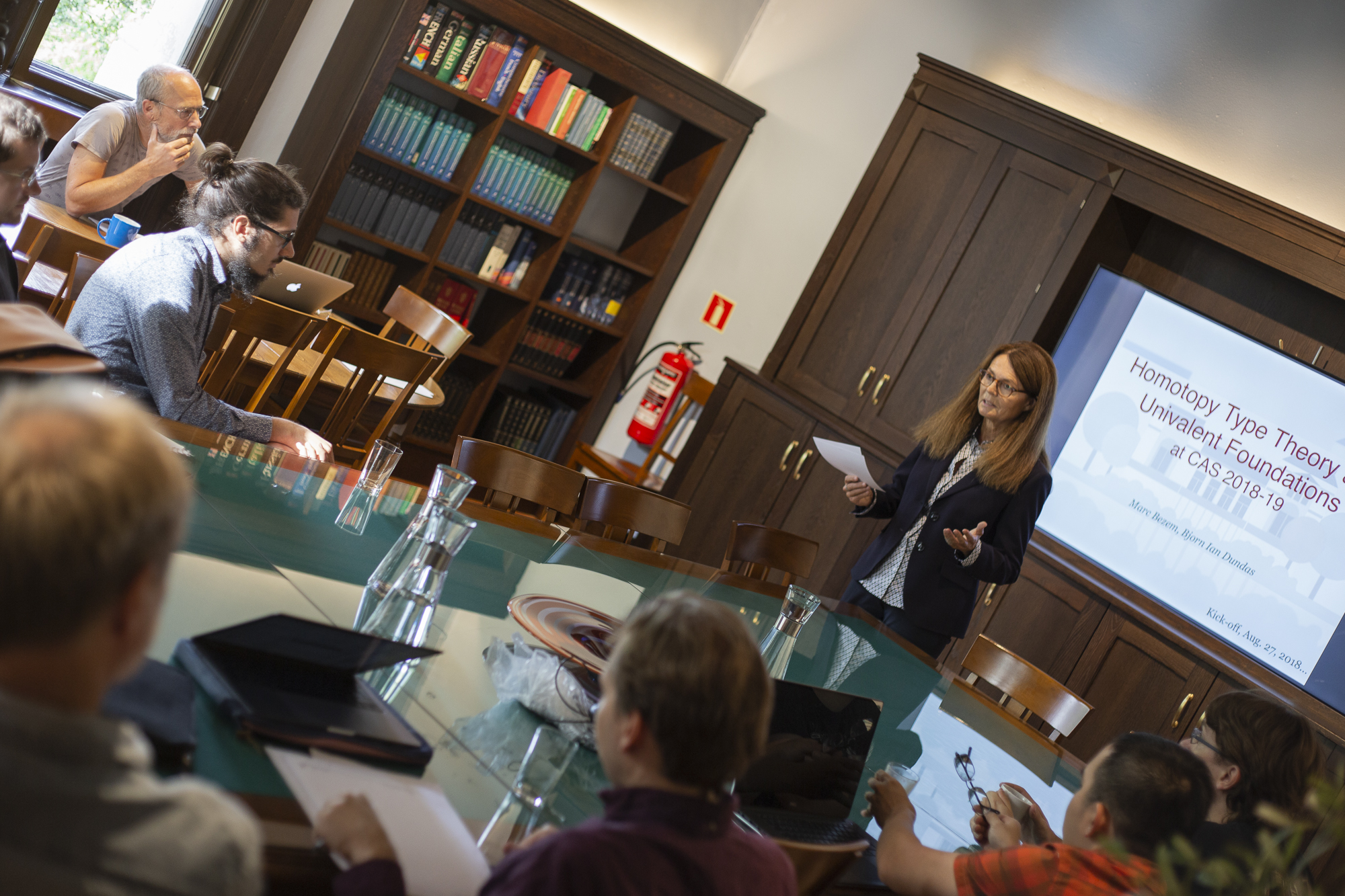Alumni Spotlight: Camilla Serck-Hanssen

Camilla Serck-Hanssen is starting her second tenure as director of the Centre this autumn. In august she welcomed new scholars to CAS and started her fourth academic year as director.
‘It makes a big impression to welcome new scholars to the Centre every year, they are always very excited and happy to be here. You can feel the intellectual curiosity and the vibrating academic activity on every floor at the Centre.’
This atmosphere reminds Serck-Hanssen of the time she came to CAS in the autumn six years ago as a project leader for the CAS project Disclosing the Fabric of Reality-The Possibility of Metaphysics in the Age of Science.
We sat down with the director to look back on her time at CAS so far, and talk about her plans for the future of the Centre.
- Read also: Meet the Scientific Director
After three years as director of the Centre for Advanced Study (CAS), you have put your mark on the Centre in different ways. Developing and expanding CAS’ programme for young researchers, establishing a scheme for CAS alumni to apply for research funding from CAS, and strengthening and building new collaborations with partner institutions have been some of your priorities. What are you most proud of having achieved during your time as director of the Centre?
I am proud that our work to develop a two-year Young CAS Fellow programme has been recognised as an important step in supporting young outstanding researchers in Norway, and that we have received a budget increase from the Ministry of Education and Research to be able to develop and expand the programme. We have had good conversations and collaborated well with the Ministry and the Young Academy of Norway in the development of the programme.
One of the goals I set when I started as director of CAS was that CAS should become more visible as a funder in the Norwegian research system and that we should initiate strategic discussions with other major funders, such as the Research Council of Norway, to make CAS’ model more known in the scientific community — both to other funders and to our partner institutions. I was pleased to experience when we were renegotiating our agreements with our partner institutions this past year that they had a greater understanding of how CAS can benefit them, so I think we have done something right.
What do you remember best from your first term as director of CAS?
It makes a big impression to welcome new scholars to the Centre every year. They are always very excited and happy to be here. You can feel the intellectual curiosity and the vibrating academic activity on every floor of the Centre. This atmosphere reminds me so much of the time I came to CAS in the autumn six years ago as a group leader, trembling with expectations, almost like the first day of school. It makes a great impression to see the same feeling among the researchers who start here every year.
I also remember the 11th of March 2020, the day we had to close down the Centre because of the coronavirus pandemic. I was among the last people to leave the Centre. The feeling I had when I left — not knowing when we could reopen the Centre for the sort of academic work that is meant to happen here — I will not forget. I experienced it as a big and unexpected responsibility to lead the Centre during a pandemic with the infection control responsibility it entailed.

You are now starting your second term as director of the Centre. What are your ambitions and plans for the Centre for the next three years?
I will continue with the same strategic long-term goals as in my first term. My ambition is to make sure these goals can be realised to a greater degree through different measures. We are looking into how we will finance our programme for young researcher after the four-year grant from the Ministry runs out, and we are hoping to expand our venues so that we can host more researchers and increase the Centre’s activities. And, importantly, my job is to make sure that most of our funds go directly to independent, curiosity-driven, fundamental research.
We also need to think more about CAS’ role and what CAS can do as a piece in a larger network of research funders. The world around CAS has changed a lot. In the past it was considered a long-term project to spend one year at CAS. Now, a year is short compared to other big research financing programmes and what they can provide. Therefore, CAS' role must constantly evolve, and we must think about how we can provide the most added value for researchers compared to other research funding options. At the same time we must be ourselves. CAS has a unique role, and we can offer something unique to researchers.
CAS' role must constantly evolve, and we must think about how we can provide the most added value for researchers compared to other research funding options. At the same time we must be ourselves. CAS has a unique role, and we can offer something unique to researchers.
CAS’ mission is to further excellent, fundamental, curiosity-driven research. Why is this important?
Perhaps the most important argument for fundamental research is that knowledge is important in itself. The goal of human existence is in many ways to seek answers and get a deeper understanding of what the world is like. Furthermore, fundamental research is both important as a knowledge base, emergency preparedness base and discovery tool.
When solving some of the big and well-known problems that the world is facing, fundamental research will be important. The years of fundamental research in all possible disciplines will prove to be a necessary piece – a knowledge base – to solve these problems, together with applied research and technology development.
We must strengthen the fundamental research also because it serves as emergency preparedness. We do not know what future challenges will look like, but it will be too late to start researching when they arrive. From an emergency preparedness perspective, it is therefore important to have breadth and depth in research in all subject areas.
Fundamental research can also be an important tool to discover new problems we did not know existed. For example, if our politicians decide to implement policy that involves the use of new technology, then fundamental research within different fields may be able to point out issues that need to be solved before the policy can be put into action.
Perhaps the most important argument for fundamental research is that knowledge is important in itself. The goal of human existence is in many ways to seek answers and get a deeper understanding of what the world is like. Furthermore, fundamental research is both important as a knowledge base, emergency preparedness base and discovery tool.
How can we secure good conditions for fundamental research?
It is CAS’ mission and purpose to further excellent fundamental research, and our funds go directly to financing research of that kind and giving researchers uninterrupted time to pursue their research questions.
In Norway, we need to consider stepping up the efforts and funding of fundamental research. Compared to our neighbouring countries we are falling behind. I think we should have the ambition that a bigger share of research is bottom-up, blue-skies research. To reach that ambition we need more funding of research-initiated fundamental research.
Has it been possible to combine the job as director of CAS with doing your own philosophical research?
Yes, in quiet periods, it is possible to combine the job as director of CAS with continuous time to do research. I have a fantastic administration that works independently, and that has helped as well to make it possible to find time for my research. What has been difficult in the last year and a half is the unpredictable infection situation that has made it difficult to concentrate and juggle both the work at CAS and my own research.
This month three new CAS projects have started up at the Centre, and two Young CAS Fellows have organised workshops at the Centre. What advice would you give to future CAS project leaders and Young CAS Fellows?
As a group leader at CAS I experienced that the time at the Centre goes by quickly and that one has to try to make the most out of it. My advice is to try to work closely with the scholars that have been invited to join the project and to have an open mind concerning the development of the project and its findings — it can turn out differently than expected. Surprising crossroads may come along. That is a good thing, and one of the characteristics of blue-skies research. In order to not spend too much time on administrating the work and the group, it can be a good idea to not invite too many guest scholars, but rather have a core group that stays for a longer time.
I hope that this academic year will be relatively normal in terms of pandemic restrictions, and that the groups that are here can work together closely and welcome scholars from abroad to the Centre.
- This interview was first published in our monthly newsletter. Sign up here.